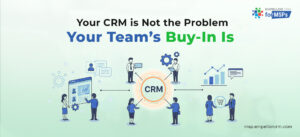Growth is the goal of every company, large or small. Big corporations continually expand their operations, while smaller businesses often position themselves for acquisition or merger opportunities. This is exciting for everyone involved, but the reality is that not every business is prepared for such events. For many, operational inefficiencies are the silent roadblocks standing in the way of progress. That’s where CRM for C-suite leaders comes in, providing the tools needed to overcome these challenges.
As a C-suite executive, you must ask yourself: Is your MSP operational structure truly ready for a prospective buyer? Can you confidently say that your business processes are scalable, efficient, and well-documented? If you’re unsure, it’s time to consider how a Customer Relationship Management (CRM) system can help create a compelling growth plan and position your company for success.
Why C-Suite Leaders Should Prioritize Operational Efficiency
In any business, operational efficiency is key to growth. Without it, even the best strategic plans can fall flat. Companies bogged down by manual processes, disjointed systems, and unreliable data cannot scale effectively. This is especially critical in the MSP (Managed Service Provider) space, where agility and real-time data are essential to maintaining competitive advantage.
Businesses that thrive are those that can seamlessly streamline their operations and have real-time visibility into every corner of their organization. But how can you achieve that? The answer lies in adopting a CRM system tailored to your business needs.
The Role of CRM in Business Growth
CRM systems, like Microsoft Dynamics 365, are no longer just tools for managing customer interactions—they are powerful platforms that support business growth. For C-suite leaders, a well-implemented CRM can transform how your company operates, helping you identify inefficiencies, manage data better, and provide deeper insights into customer behaviors and market trends. Here’s how:
1. Streamlined Operations
Many companies find themselves using disparate systems for different functions—one system for sales, another for service, and yet another for marketing. This leads to fragmented data and inefficiencies that slow down the business. A CRM system unifies these functions into a single platform, allowing your team to access the same data and work more efficiently. This holistic view of your operations not only eliminates manual, time-consuming processes but also ensures consistency in customer interactions.
2. Scalability for Growth
A CRM helps businesses scale efficiently by automating repetitive tasks, improving communication across departments, and ensuring that data is accurate and up to date. As your business grows, your CRM grows with it, supporting larger volumes of data and more complex workflows. Whether you’re handling an increase in customer queries, managing more deals, or expanding into new markets, a CRM system ensures that your infrastructure can handle growth seamlessly.
3. Improved Data Visibility
C-suite leaders need access to real-time data to make informed decisions. A CRM provides detailed reporting and analytics that give you a bird’s eye view of your business. From sales performance to customer satisfaction, you can monitor key performance indicators (KPIs) in real-time, enabling faster, data-driven decisions that drive growth. You can also forecast trends more accurately, giving you the insights you need to anticipate future needs and opportunities.
4. Preparing for Acquisition or Exit
For businesses preparing for acquisition or exit events, having streamlined operations and comprehensive data visibility is crucial. Investors and buyers want to see that your company has a scalable and efficient structure in place. A CRM demonstrates that you have the systems and processes needed to manage growth effectively, making your business more attractive to potential buyers.
Building Your Growth Plan with CRM
Creating a compelling growth plan starts with assessing where your company stands today. Ask yourself these questions:
- Are your operations as streamlined as they could be?
- Is your data centralized and easily accessible for decision-making?
- Do your teams work efficiently across sales, service, and marketing functions?
- Can your current infrastructure handle growth without overwhelming your staff?
If the answer to any of these is “no,” then your growth plan needs to include the implementation of a CRM. By centralizing your data, automating workflows, and providing actionable insights, a CRM helps you build a solid foundation for growth.
Conclusion: The Urgency of Taking Action
The business world is evolving rapidly, and those who fail to adapt will inevitably fall behind. Without a clear growth plan supported by a robust CRM system, your business risks being outpaced by more agile competitors. Don’t let operational inefficiencies and disjointed systems hold you back.
If your company is not already leveraging a CRM to streamline processes and prepare for growth, the time to act is now. The longer you wait, the more opportunities you miss, and the further you fall behind. In a fast-moving market, those who hesitate are left in the dust.
Empellor CRM has helped countless MSPs transform their operations and prepare for future growth. Don’t get left behind—contact Empellor CRM today to learn how we can help your business thrive and put you in the driver’s seat for success.
Take action now before it’s too late.





